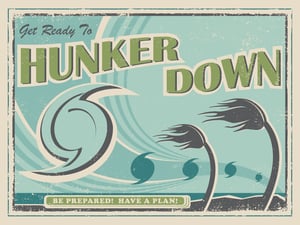
Homeowners in storm-prone areas must be ready for a possible evacuation as hurricane season approaches. Hurricanes and other natural disasters endanger both life and property which is why it is essential to create an emergency plan for your home to minimize the effects. If you have a mortgage and are a homeowner, we want to make sure you are protected during these times. Let’s take a closer look at what you should do when preparing to evacuate from a hurricane.
What to do before evacuating for a hurricane as a homeowner with a mortgage
As a homeowner with a mortgage, it's important to be prepared for a hurricane evacuation.
Create a Hurricane Evacuation Plan
In the event that you need to evacuate, it is important to plan where you are going. Other important details include how you’ll get there when you need to leave, and what you need to bring. It is a good idea to create an emergency plan (communicated to your household) that can be followed if there is a need to secure your house and/or evaluate it. Create an emergency kit, make sure you understand the various emergency alerts, and be sure to check your insurance coverage prior to the storm or natural disaster.
Secure Your Home Before the Storm
Make sure your house is secure before you leave. Turn off all utilities and shut and lock all windows and doors. Additionally, you may need to board up your doors and windows. Items like patio furniture and other outdoor or exposed objects should be safely stored or secured.
Take Photos of Your Home
Before you leave your house, take pictures of it. This will assist you in recording any hurricane-related damage. Take pictures of the outside of your house AND take pictures of the inside too. This will help you make a detailed list for your insurance company if you sustain damage and need to file a claim.
Collect Important Documents
- Gather any necessary papers before leaving your house and put them in a waterproof, accessible container. These records could consist of:
- Mortgage documents, homeowners, and flood insurance policies: These documents serve as evidence of your property's ownership and protection. It is also important to know who has your homeowner's insurance policy and have their phone number easily accessible
- Identification: Bring your passport, driver's license, and any further identification you may have, like birth certificates and social security cards.
- Utility bills, property tax records, or other documentation proving your address are acceptable forms of proof of residency.
- Medical records, including prescriptions, health insurance cards, and medical histories.
- Financial records, including credit card numbers, bank account details, and any other important financial details.
Make Arrangements for Your Pets
Before leaving, make plans for your pets if necessary. You can either bring them along with you, board them with a friend or relative, or take them to a sanctuary for animals. Don't overlook their necessities as well. Food, water, medications, and any other items they might need, like vaccination records, should be brought.
Cash and Credit Cards
When there is a power outage, ATMs and credit card readers likely won’t work. Carry enough cash with you to cover your daily expenses throughout the evacuation time, including gas, food, and lodging. Once you are in a safe place, with power, a credit card can be beneficial.
Basic Survival Supplies
When evacuating or riding out a storm in place, it's essential to have a supply of necessities that can sustain you for several days. These supplies may include:
- Fill up your car with gas a few days before the storm: It is always smart to have a full tank of gas so that you can evacuate if necessary
- Water: At least one gallon of water per person per day for drinking and sanitation.
- Non-perishable food: Stock up on canned goods, energy bars, and other easy-to-carry food items.
- First aid kit: Bandages, antiseptic wipes, pain relievers, and any essential medications.
- Flashlights and batteries: Ensure you have a reliable light source in case of power outages.
- Portable radio: A battery-operated or hand-cranked radio can keep you informed about the hurricane's progress and relief efforts.
- Personal hygiene items: Pack items like toilet paper, hand sanitizer, wet wipes, and soap.
After the storm (if you have sustained property damage)
- Contact your Home Insurance Company to File a Claim: If your home sustained any damage during a hurricane or other natural disaster the first step is to notify your homeowners insurance and file a claim. The sooner you file your claim the company can send out an adjuster to your property and begin the claims process.
- Contact FEMA (Federal Emergency Management Agency) to register for assistance. Their number is (800) 621 – 3362.
- Contact your mortgage servicer and explain your situation. If you need financial assistance, they may be able to help you.
For homeowners, safety should come first during a hurricane. Rapid evacuation and having the appropriate supplies on hand can significantly reduce risks and keep you safe during a storm. Consider the advice and take the required actions to be ready for any potential evacuation to keep yourself and your property protected.
For over 90 years the expert staff of loan officers and servicers at Standard Mortgage (NMLS#44912) have been helping homeowners with all of their mortgage needs.





